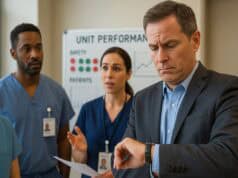Here's an interesting recent article from the Wall Street Journal (you might require a subscription to read it):
The Economy's Last Best Hope: Superstar Middle Managers
Anemic growth, millennial malaise, you name it–blame a lack of inspiring bosses
I'll comment first that organizations that have high aspirations of “Lean Transformation” need to have “transformational leaders.” Sadly, those transformational leaders seem to be few and far between. How many organizations have “bureaucrats” at the helm?
Executive leadership matters greatly. But, the WSJ also looks at the role of middle managers in that piece.
Hear Mark read this post — subscribe to Lean Blog Audio
How can we spur better economic growth?
“Here's a crazy idea: What if it's something simple? What if companies could fix the problem by hiring better middle managers?”
I'll add a crazier idea… what if instead of “hiring” better managers, our organizations focus on developing better managers and growing people and their capabilities? Will that turn everyone into a transformational leader? Maybe not, but they'll be better equipped to lead changes at a smaller scale — and that matters too.
A Gallup survey of two million people…
“…confirmed something Gallup had seen before: a company's productivity depends, to a high degree, on the quality of its managers.”
That seems like a “well, duh” moment perhaps.
More from Gallup and WSJ:
“What no one saw coming, however, was the sheer size of that correlation–something Gallup calls “the single most profound, distinct and clarifying finding” in its 80-year history. The study showed that managers didn't just influence the results their teams achieved, they explained a full 70% of the variance. In other words, if it's a superior team you're after, hiring the right manager is nearly three-fourths of the battle.
No other single factor, from compensation levels to the perception of senior leadership, even came close. “That blew me out of my chair,” says Jim Clifton, Gallup's chief executive.”
I'll look forward to the book that's coming out next month, from Gallup, that elaborates on all of this:
It's the Manager: Gallup finds the quality of managers and team leaders is the single biggest factor in your organization's long-term success
Previous Gallup research shows that “highly engaged employees” lead to better results. What leads to higher engagement? Better leadership.
Organizations and leaders need to stop blaming employees for being disengaged or for not being as highly engaged as is possible. Leaders create the tone and the culture in which people can thrive (or not).
Gallup research shows that, in the top organizations, twice as many employees are highly engaged — as compared to the national average.
The WSJ article points out the flaw in companies taking a star performer and turning them into a manager. A great nurse or a great engineer won't automatically become a good manager. There are different skill sets or aptitudes involved… and many organizations, sadly, don't invest enough into basic Supervisor 101 training (this seems to be a particular problem in healthcare). We can't just assume that people will figure out “the management thing” if they're smart and hardworking.
Does your organization do a great job of developing middle managers? Has that made a difference in the context of “Lean Daily Management” or other Lean practices? Has that helped your “transformation” efforts — or would it?
Please scroll down (or click) to post a comment. Connect with me on LinkedIn.
Let’s work together to build a culture of continuous improvement and psychological safety. If you're a leader looking to create lasting change—not just projects—I help organizations:
- Engage people at all levels in sustainable improvement
- Shift from fear of mistakes to learning from them
- Apply Lean thinking in practical, people-centered ways
Interested in coaching or a keynote talk? Let’s start a conversation.










My former company did a great job developing better middle managers in the 1990s. They provided extensive and expensive training, both with respect to so-called hard and soft skills (in particular, kaizen, leadership behaviors/competencies, and business decision-making skills). However, a problem soon emerged: the middle managers who largely ignored the training were promoted more often to executive level over those who took the training seriously and actually became better (more progressive) managers. This speaks to the bimodal nature of engagement; both types of manager were engaged, though there was a large group in the center that was not engaged and just went through the motions to get their job done. HR executives recognized the problem of who got promoted, but they had no influence over the executives who preferred to promote traditional managers. As a result, the status quo was maintained and the company continued to struggle in various ways for years thereafter. So, in a nutshell, the institution of leadership, with its own internal logic (based on classical management), differed greatly from what HR was trying to create, which was managers who understood the institution of work — the genba (based on TPS).
LinkedIn Discussion:
I’m not surprised that our friend Dan Markovitz also wrote about this for IndustryWeek:
Want Higher Engagement? It’s Not Just About Hiring Better Managers
“What if we set up policies and processes so it’s easy for people to grow in their jobs?”